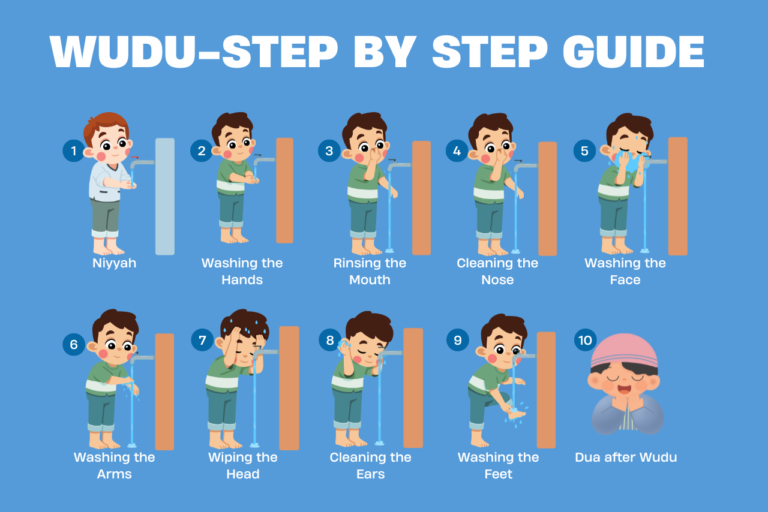A Comprehensive Guide on What Breaks Wudu & What Does Not
Maintaining spiritual purity is a core aspect of Islamic practice. At the heart of this purity is performing wudu, or ablution, a ritual that prepares Muslims for prayer and closeness to Allah. But what breaks wudu, and how can you ensure it remains intact throughout your day? This blog will explore the various actions and things that break wudu, providing insights and frequently asked questions on what breaks wudu or what does not.
Participate in our Quran educational courses and learn fiqh, it will provide you with valuable insights and support for your spiritual journey.
The Importance of Maintaining Wudu in Islam
The act of wudu holds immense importance in Islamic practice, symbolizing both spiritual and physical purity. It is a prerequisite for salah and reading the Quran that forms the backbone of a Muslim’s religious life.
Maintaining wudu throughout the day is also encouraged, even outside of prayer times. Many Muslims find that staying in a state of wudu fosters a continuous awareness of their faith and keeps them spiritually grounded. This ongoing purity can act as a shield against sins, helping believers to remain mindful of their actions and relationship with Allah. By regularly renewing wudu, Muslims reinforce their devotion and readiness to engage with the divine at any moment.
What Breaks the Wudu

Every Muslim must understand what breaks wudu. There are two types of things that break wudu (ablution).
- Those related to something that exits the human body, such as urine, stool, blood, etc.
- Those that affect a person’s state, such as unconsciousness, sleep, etc.
Those Related to Something That Exits the Human Body
The first category involves things breaking wudu are those exiting the human body. These can further be divided into two subcategories:
- Those that exit through the pathways of urine and stool.
- Those that exit from other parts of the body, such as vomit, blood, or fluid, etc.
These actions are understood to invalidate wudu, requiring it to be renewed before engaging in prayer. These include activities related to bodily functions:
Urine, Stool, or Passing Gas
Any release of urine, stool, or even farting breaks wudu and requires the renewal of wudu, as it is considered an impurity release. [Sahih al Bukhari: 135]
Discharge of Mazhi or Wadi
Any release of Mazhi (prostatic fluid) or Wadi (secretion discharge after urination) breaks Wudu and requires washing the sexual organs and clothes (if contact with it) and the renewal of wudu. It is also considered an impurity release. [Maraqi al-Falah, p.100]
A Mouthful of Vomit
Vomiting breaks wudu. If the vomit is of bile, blood, food, or water and it fills the mouth, Wudu is nullified. If it is less than a mouthful, Wudu remains intact. (A mouthful of vomit is defined as the amount that cannot be held back without difficulty.) If pure phlegm is vomited, Wudu is not nullified, even if it fills the mouth. [Maraqi al Falah 1/39]
Fluid from the Eye, Ear, or Breast
If fluid emerges from the eye, ear, breast, navel, or any part of the body accompanied by pain, Wudu is nullified. If fluid emerges without pain, Wudu is not nullified. If fluid emerges from the eye without any pain or irritation, and it is due to a cold or for no reason at all, Wudu is not nullified. [Radd al-Muhtar by Ibn Abidin]
Blood and Pus
Bleeding breaks the wudu under some conditions. As blood is considered an impurity. So any impure substance exits from any part of the body other than the mentioned pathways and flows or surpasses on the body, like blood, pus, etc., Wudu is nullified, even if only a small amount flows. However, if blood or any other substance comes out but doesn’t flow Wudu is not nullified. [Al-Hadiyya al-Ala’iyya]
Blood from a Wound
If blood emerges from a wound and is wiped away repeatedly until it stops. If the total amount of blood that emerged and was wiped away is enough to flow, Wudu is nullified; otherwise, it is not.
Blood from Mouth
If blood mixes with saliva and comes out from the mouth or teeth, if the blood is equal to or more than the saliva, Wudu is nullified; if it is less, Wudu remains intact.
Nosebleed
Nosebleed breaks wudu, if clotted blood, greater than the size of a lentil, emerges while cleaning the nose. Otherwise, it remains intact.
Those That Affect a Person’s State
Another set of actions relates to changes in consciousness or contact that can affect wudu:
Sleeping or Napping Loosing One’s Control
Sleeping breaks wudu under some circumstances. Sleeping or napping breaks the wudu if sleep is overwhelming. If someone sleeps while lying down, whether on his back, stomach, or side, or with support such that his buttocks are lifted from the ground, or he sleeps on one buttock with support, Wudu is nullified. Support means that if the support is removed, he would fall. [Dars Tirmidhi p 294-295 v1]
If a person is sitting on both buttocks, with his knees raised and hands wrapped around his legs, with his head resting on his knees, Wudu is not nullified if he sleeps in this position.
However, if someone sleeps while standing or sitting without support, or while in a position of prayer that is recommended for men, such as in a bowing position, prostrating, or sitting for Tashahhud, Wudu remains intact. [Fatawa Darul Uloom Deoband]
Unconsciousness
If someone becomes unconscious due to illness, fainting, insanity, epilepsy, or intoxication, Wudu is nullified, even if it is for a short period. The limit is when the person’s legs become unsteady and control over bodily functions is lost during these states. [Ibn Qudamah said in al-Mughni: 1/234]
Laughing Loudly During Prayer
Laughing loudly, especially during prayer, can break wudu. If someone laughs out loud in prayer, such that those nearby can hear it, Wudu and prayer are both nullified, whether done intentionally or by mistake. However, if someone laughs out loud outside of prayer, Wudu is not nullified. The Holy Prophet (Allah bless him and give him peace) said:
“Whosoever laughs out loudly amongst you, let him repeat both his ablution and Salah.” [Daraqutni]
Intimate Physical Contact
If genitals (the private parts of a man and woman) touch each other without a barrier, Wudu is nullified depending on the specific school of thought followed. (Based on ‘Umdat al-Fiqh’)
These are a few general principles; for specific cases, one should ask a knowledgeable person for clarification. These actions emphasize the need for mindfulness and awareness while maintaining wudu, reinforcing the connection between physical state and spiritual purity.
Actions That Do Not Break the Wudu

While there are several things that nullify wudu, many activities do not affect the wudu. Understanding what breaks wudu, can provide clarity and confidence in one’s daily spiritual routine:
The following actions do not break Wudu:
- Eating, drinking and smoking.
- The appearance of blood that does not flow from its place.
- Flesh falling off without blood flowing.
- A worm emerges from a wound, ear, or nose.
- Touching the genitals.
- Touching a woman. (depending on the specific school of thought followed)
- Vomit that does not fill the mouth.
- Vomiting phlegm, even if there is a lot of it.
- Sleeping while leaning against something, such that if the support is removed, the person will not fall.
- Falling asleep during prayer, even in the state of bowing or prostration, does not break Wudu unless the person falls over.
Knowing these exceptions to what breaks wudu, help Muslims maintain their state of wudu without unnecessary worry, enabling smoother transitions between worldly tasks and spiritual obligations.
FAQs on What Breaks Wudu
Q1. Does burping break wudu?
No! Burping does not break the wudu although it releases a gas from your stomach.
Q2. Does popping a pimple break wudu?
If a flowing quantity of pus comes out of the skin or surpasses the area of skin, through popping the pimple, the wudu will be nullified. [Al-Hadiyya al-Ala’iyya]
Q3. Does cutting nails break wudu?
No! cutting nails after wudu does not break the wudu. [Dar ul uloom]
Q4. Does cursing break your wudu?
No! cursing someone does not break wudu, however, it is mustahabb to do wudu after cursing, backbiting or exchanging bad words, etc. (Nawawi)
Q5. Does touching a dog break wudu?
No! Touching a dog or his saliva does not break the wudu. However, it is recommended to wash away the solid area if dog is wet or saliva touches the surface. [Islamqa]
Q6. Does listening to music break your wudu?
No! listening to music does not break the wudu. Although it is a sin.
Q7. Does touching your private parts break wudu?
No! touching the genitals, without release of any fluid, does not break the wudu even though it is done without a veil. [Umdat al-Ria’ayah ala sharh al-wiqayah 1:72]
Q8. Does precum break your wudu?
Yes! Emitting the liquid at the time of erection, also known as Mazi, is impure and requires washing the area and wudu. [Maraqi al-Falah, p.100]
Q9. Crying break wudu?
No! crying or coming tears out does not require wudu.
Q10. Does changing clothes break wudu?
No! changing clothes does not break wudu.
Conclusion
Understanding what breaks wudu is an essential part of Islamic practice, reinforcing the importance of purity and preparation for worship. By knowing the actions and things that break wudu and do not affect wudu, Muslims can confidently maintain their spiritual cleanliness and perform prayers with sincerity and focus.
For those seeking further guidance on what breaks wudu and how to maintain it, numerous resources are available in Knowledge Quran Academy. Engaging with our knowledgeable scholars and participating in Quran educational courses can provide valuable insights and support for your spiritual journey.







2 Comments